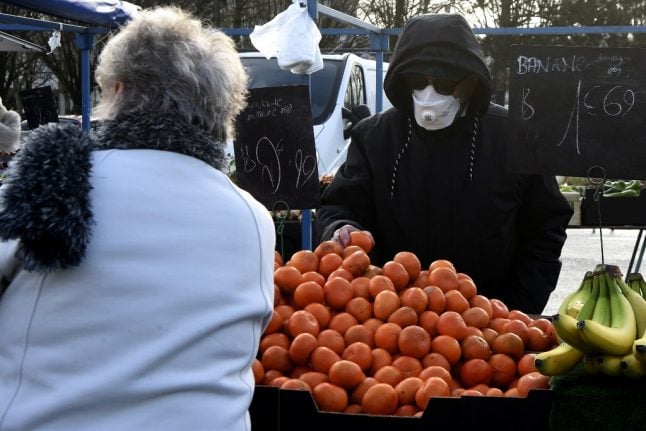READ MORE: Coronavirus latest – Number of confirmed cases in France continues to rise
What can the public do?
On Sunday France's director general of health Jérôme Salomon reminded the public of “simple and effective” actions they can take to avoid catching or indeed spreading the virus.
He stressed there was a need for the public to prevent the virus spreading via hands.
Salomon advised people to greet others at a distance rather than by shaking their hands or kissing them as is the custom in France.
The country's health minister Olivier Veran first advised against shaking hands on Friday.
The health chief stressed the need for people to wash their hands regularly either with soap or special hand sanitiser containing alcohol.
Disposable tissues should be used and then thrown away immediately after use.
People should also sneeze or cough into their elbow rather than hands.
Salomon reminded the public that wearing face masks when out and about was not an answer to avoiding catching the virus because they can't be worn permanently and people are only likely to catch the virus if they spend prolonged and close contact with an infected person.
Masks should be worn by people who have symptoms of the virus or by health professionals.
CLICK HERE for a full list of everyday precautions to take to avoid coronavirus
Avoid unnecessary travel
On Sunday French health chiefs advised the public against any non-essential travel.
“We are doing everything to slow down and bring to a halt the evolution of the virus by reducing the contacts and mingling of the population,” said Director General of Health Jérome Salomon.
“An important reminder; non-essential trips should be delayed especially those to outside the European Union,” he said.
READ ALSO: What you need to know about coronavirus in France
Large enclosed events now banned
On Saturday France took the step of banning large scale indoor events. That meant that “gatherings of more than 5,000 people” in enclosed areas as well as some external events would be scrapped until further notice.
French Health Minister Olivier Veran said the cancellations of external events would affect gatherings in open areas where there would be “intermingling with populations from areas affected by the virus”.
Sunday's Paris half-marathon was also cancelled.
Schools closed in nine towns
The centre of the recent outbreak in France is the Oise département in the northern region of Hauts-de-France.
On Monday local authorities said schools in nine towns in the Oise would remain closed. The towns were: Creil, Nogent-sur-Oise, Montataire, Villers-Saint-Paul, Crepy-en-Valois, Vaumoise, Lagny-le-Sec, Lamorlaye and Lacroix-Saint-Ouen.
Locals have been advised not to gather in the towns and to work from home if possible.
Self-isolation for returning travellers
If you have recently returned from China (including Hong Kong and Macau), Singapore, South Korea, Iran or the Lombardy or Veneto regions of Italy, the French government is asking you to self-isolate for 14 days to ensure that you do not have symptoms.
The French authorities are merely advising you to avoid “unnecessary contact” especially with frail people and gatherings and monitor your health and wash hands regularly.
Trips to the shops are not banned, so there is no need to start stockpiling and panic-buying.
Special phone number
A reminder that France has launched a special hotline number so worried members of the public can seek help and advice that is manned 24/7.
The number is 0800 130 000. The emergency number 15 should only be used if the a member of the public believes they are suffering from a medical condition linked to coronavirus.
☎️ Un numéro gratuit d’information sur le #Coronavirus #COVID19 est disponible 7 jours sur 7 de 8h00 à 21h00. Appelez le 0800 130 000 (appel gratuit). pic.twitter.com/fHt8KTkk73
— Gouvernement (@gouvernementFR) February 26, 2020



 Please whitelist us to continue reading.
Please whitelist us to continue reading.
Member comments